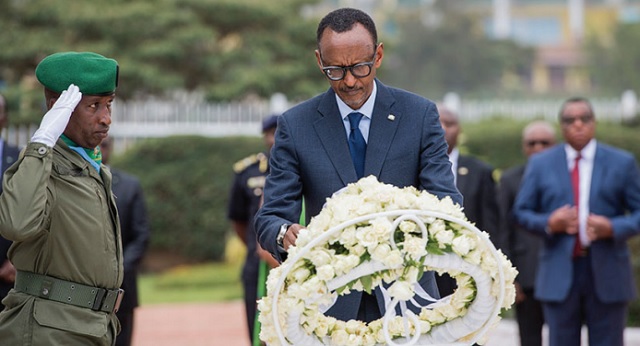
Three Rwandan war heroes give moving testimonies on 24th Heroes Day
Kampala, Uganda | FRANCIS BYARUHANGA | Jonathan Muvunyi was 18 years old but already fighting to liberate his country with the Rwandan Patriotic Front (RPF) when he was injured in 1994. He was hospitalised in Byumba from 1994 to 2008. The government built him a free house. He adopted three children and his last-born is graduating from university this year.
“I am so happy for my country’s development,” he says, “We got what we fought for.”
Protogene Biraguma was also 18 years old and a fighter with RPF when he was hit by enemy bullets in Kibungo, now Ngoma. He was hospitalised in Kibungo Hospital from 1994 until 2008. The government later gave him a free house to live in and start his own business.
John Ndekezi, President of the Injured Soldiers of the War, Kibaya Village, says he joined the army in 1991 and got accident while driving at Ruhengeri. However, he says, despite the resultant physical disability which led him to start using a wheelchair, he is well and looking after his two children and three that he adopted.
“We really thank our leadership for always remembering us,” he says, “They didn’t let us beg for food on the street.”
These are some of the moving testimonies that Rwandans heard on Feb.01 as they marked Heroes Day with celebrations organised at village level under the theme of “upholding heroism to build the Rwanda we want”.
At national level, President Paul Kagame and other senior government officials laid the wreath on the graves of the Heroes at National Heroes Mausoleum in Remera, Kigali.
The Chairperson of the Chancellery for Heroes, National Orders and Decorations of Honour, former Prime Minister Dr. Pierre Habumuremyi, said heroism with a Heroes Day lies in the need to preserve the good example that was set by some of the freedom fighters and that other young Rwandans could emulate them.
He said the country was liberated through the miracles and added, however, that many individuals made sacrifices and they need to be honored.
Some speakers at the grassroots, such as Sylvestre Nyandwi; the Executive of Kamashahi cell in Kanombe, Kigali, said there is a need to teach heroic virtues to the youth so that it could be a legacy to all Rwandans. He urged the youth present at the function to shun vices like drug abuse, prostitution, and alcoholism that could potentially ruin them and limit them from becoming Rwanda’s future heroes.
“You cannot grow in the destructive lifestyle and then expect to be a hero,” he said and cited some of the Rwanda’s prominent heroes including Michel Rwagasana, King Rudahigwa and Fred Gisa Rwigema.
Legacy of heroism for youth
Aridee Ntwari , the Executive Director of the Foundation for the Youth Future; an organisation that fights drug abuse and promotes the betterment of the youth, said heroes day means conserving what was achieved. He added that the present generation must foster development through mobilising the youth to avoid vices that could hinder development of the generation of tomorrow.
Felix Manzi, The program officer, National Youth Council, advised the youth against aping negative western culture that erodes the rich Rwandan culture. He named the rate at which the youth are discarding the names of their forefathers in favour of western names as a form of cultural imperialism. He said it is better to retain the names of their forefathers and urged the youth to embrace heroic values and practice them through finding solutions of their problems. For instance, he said, the main contemporary problems are the lack of jobs and unemployment. He said youth could turn these challenges into opportunities.
 The Independent Uganda: You get the Truth we Pay the Price
The Independent Uganda: You get the Truth we Pay the Price





